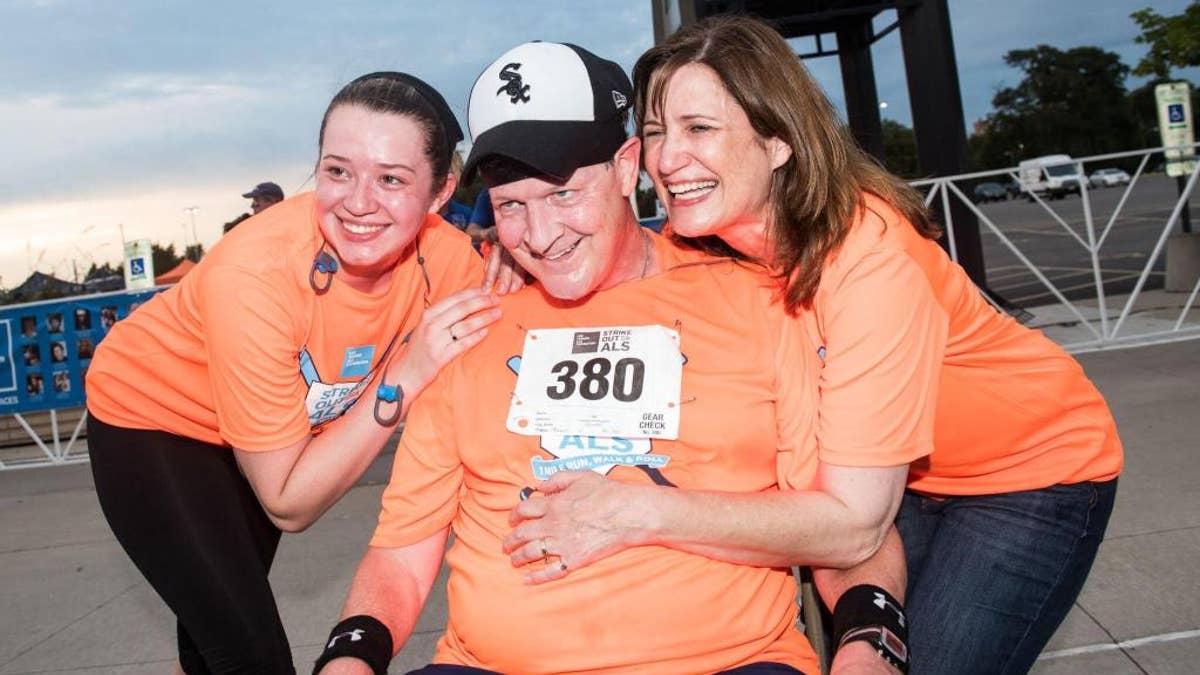
When Kip Fontana decided to run his first 5K this year, he had a problem to solve: what to do with his arms.
Fontana, 59, was diagnosed with amyotrophic lateral sclerosis, ALS, seven and a half years ago. The disease gradually destroys the nerve cells that control muscle movement, typically ending in total paralysis and death.
As his case has progressed, Fontana has lost most of his upper-body strength. When he tried running, his arms flapped, interfering with the natural rotation of his torso.
GIRL'S HIV INFECTION SEEMS UNDER CONTROL WITHOUT AIDS DRUGS
But the Warrenville, Illinois, resident was determined to finish the Les Turner ALS Foundation’s Strike Out ALS 5K to raise funds and awareness for the condition that affects him. (Here’s the fundraising page for Kip’s Crew.)
So he engineered a device to support his arms. He looped an orange piece of exercise tubing behind his neck and around each of his arms, securing the ends around big black sweatbands with carabiner clips.
When his neurologist expressed concern that the band dug into his spinal cord, Fontana remembered the horse-collar cushion inside the neck of his high school football uniform. He bought a piece of the foam padding, cut it open, and taped it around the tubing.
Outfitted with this system, he began training, running three times a week and lifting weights twice. And on a steamy Chicago night this week, he finished the race, crossing the finish line in 46:14.
The dedication and MacGyver-like ingenuity are typical of how Fontana has navigated the course of the disease, according to his wife, Laura. “He has this internal relentlessness,” she says.
TEXAS MAN LOSES MORE THAN 200 POUNDS TO JOIN ARMY
When he first told her of his plan to run, she wasn’t surprised, despite the fact he’d never done so before. (Besides football, he’d competed in Tae Kwon Do, but never endurance sports.) “I took a deep breath, because I knew it would happen, even against all rational thinking that it should,” she said.
Most patients die within three to five years of developing ALS. Kip Fontana’s worsening condition led him to retire from his career as a high school psychologist last year. At night, an assistive machine helps him breathe.
Not everyone would choose this moment to take up a new sport. But Fontana had his reasons.
“One of the things that I see at the ALS clinic is a lot of patients who have the look of, what’s the point?” he said. “Well, I really am trying to change that mindset and say, ‘The point is to do everything you can to maximize the time you have on Earth.’”
Fontana faced other obstacles en route to the finish line. About two weeks before the race, his hips felt stiff, then ached. The pain worsened to the point that he went to an orthopedic specialist.
X-rays revealed severe arthritis. The doctor advised him not to run at all. So Fontana took time off from training, resting his hips and legs. Still, there was no doubt he’d toe the starting line, Laura Fontana says.
Fontana’s 19-year-old daughter Kara also ran her first 5K that night. “I was a little behind him, just because he’s a better runner than I am,” she said. About halfway through, “I could see him start to drop. He slowed down, and I wasn’t slowing down, so I caught up with him.”
When she reached her dad, he told her the problem: He’d lost control of the muscles in his neck. She grabbed the back of his White Sox cap to hold up his head, and they headed for the finish line, crossing together.
FLORIDA MAN CONTRACTS FLESH-EATING BACTERIA THROUGH BLISTERS WHILE HIKING
Kara, who’s studying biology at the University of Wisconsin-Madison in hopes of attending medical school, cleared a few hurdles of her own to run. She has severe asthma, and doctors banned her from all cardio the first five months of the year after a skiing-related concussion.
But the choice to join her dad for the race was simple. “Nothing seems hard with him as my inspiration,” she said.
After crossing the finish line, Kip Fontana nearly collapsed. His wife and daughter embraced him, and volunteers brought him a chair and some water. He sat, pouring sweat. After a minute, he smiled. And when he learned a few more people finished behind him, his smile grew wider.
Though he’ll probably stop running because of his hips, Fontana has already contacted his gym about spinning classes. “This was just one race,” Laura Fontana said. “And it’s not over—he’s going to continue to have goals.”
This article first appeared on Runner's World.
